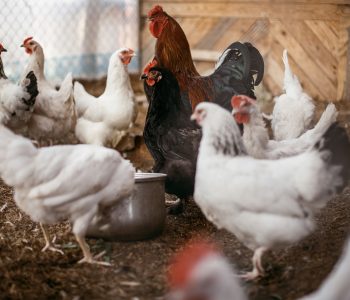Researchers at the University of Nottingham (Alkhtib et al., 2020) developed nanoparticles of methionine-coated zinc oxide that improve digestibility and bioavailability of the mineral in broiler diets. Improved productive parameters and lower zinc residues in faeces were observed. The present article reports the findings published by Alkhtib et al. (2020).
Why using methionine-coated zinc nanoparticles?
Zinc has many roles in the body. It takes part in many biochemical pathways, being relevant to growth, tissue repair, and bone and feather development, among other functions.
This trace mineral is obtained in the diet, which is in part supplemented since zinc is in a variable proportion associated to phytates. Organic zinc, in which the trace mineral is associated to organic molecules (e.g. amino acids) avoids the formation of insoluble compounds with components of the diet, improving digestibility and availability on the intestine compared to the inorganic forms (e.g. ZnO). However, part of the dietary Zn (normally in excess) is not absorbed and released to the environment, becoming a pollutant.
The question was whether amino acid coated mineral nano particles could improve the availability of minerals in vivo, whilst reducing environment pollution due to elimination of residues in faeces? Researchers at the University of Nottingham addressed this question conducting the first trial of this nature in broiler chickens. Their hypothesis was that zinc nanoparticles would help to improve the absorption in the intestine, reducing the amounts to be supplemented, and decreasing the amounts excreted to the environment.
The experiment
In the trial, newly developed nano-zinc particles with methionine coating (M-Nano-ZnO) and without coating (Nano-ZnO), as well as commercial inorganic (ZnO, control) and organic (M-Zn) zinc supplements, were added to four different diets. Titanium dioxide was used as digestibility marker. All diets were adjusted to reach the zinc: methionine ratio 1:2 present in M-Nano-ZnO. All of them contained phytases.
The results
Birds fed a diet with M-Nano-ZnO showed a significantly higher coefficient of digestibility (COD) at days 21 and 35. The increase in digestibility does not only reduced the amount of zinc supplement needed, but can also help reducing soil pollution with zinc.
M-Nano-ZnO improved weight gain during the first three weeks and overall, but not between days 21 and 35. Birds receiving M-Nano-ZnO were the closest to the body weigh target for the breed at day 21 and 35 days of age (about 10 g from the expected mean). They also gained 2-5% extra per week than the non-coated Nano-ZnO, but that was only evident at day 35.
The improved body weight gain for birds fed M-Nano-ZnO seemed to be the result of the combination between an improved Zinc digestibility and an increased feed intake. The increase of the appetite could be mainly attributed to a higher availability of Zn. However, it could also be attributed to other factors, such as changes in the production of growth hormone, as well as an improvement in the immune status of the birds.
In order to avoid possible skeletal issues, it would be advisable that a higher growth rate was accompanied by an increase in bone resistance. M-Nano-ZnO has a positive effect on bone strength at day 21 (as well as M-ZnO), but that effect disappeared by day 35. This suggested that the supplementation with M-nano-ZnO helps preventing bone issues during the three first weeks, but it may not reduce any issues of leg strength during abattoir processing.
Thanks to the currently available high throughput technology, which can produce the nanoparticles at a high rate and from low cost sources of zinc, the cost of M-Nano-Zn is comparable to the combined price of commercial feed grade zinc supplements.
Was the initial question answered?
In the light of the positive results obtained in broiler performance and mineral digestibility, the authors concluded that zinc nanoparticles coated in methionine could be used as a more efficient, less polluting supplement. Furthermore, this experiment opens the possibility of this technology being developed for other minerals.
Peer reviewed paper reported in this article:
Alkhtib, A., Scholey, D., Carter, N., Cave, G. W. V., Hanafy, B. I., Kempster, S. R. J., Mekapothula, S., Roxborough, E. T., & Burton, E. J. (2020). Bioavailability of Methionine-Coated Zinc Nanoparticles as a Dietary Supplement Leads to Improved Performance and Bone Strength in Broiler Chicken Production. Animals, 10(9), 1482. https://doi.org/10.3390/ani10091482
It can be directly downloaded from the journal Amimals.
